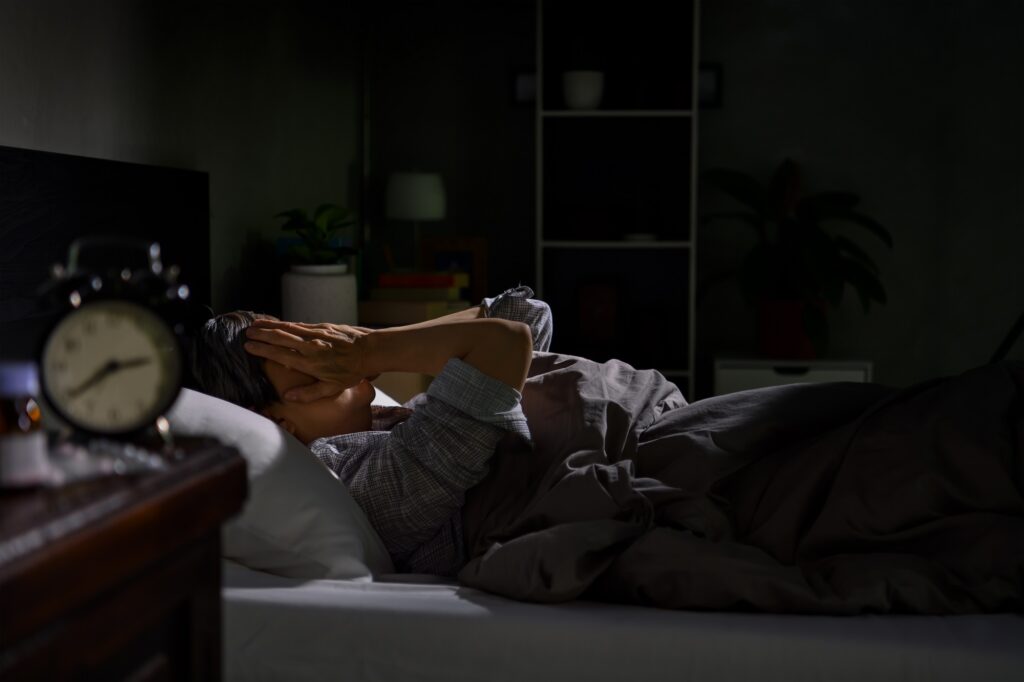As your elderly parent ages, you might start to recognize changes in their behavior. They may be more anxious than they used to be, especially if they live alone. Anxiety in seniors at night is fairly common. It could be a result of worrying about tripping and falling, or a more general sense that something is wrong. It is important you let them know that their feelings are not uncommon and that you also do what you can to help them feel comfortable.
Anxiety in seniors could also be indicative of a more serious problem. Those with Alzheimer’s disease and dementia are prone to anxiety or mood changes at night, and may experience issues like sundowning and nightmares.
Symptoms of anxiety in seniors with Alzheimer’s and dementia
Nightmares
When a senior experiences depression, anxiety, or sleep apnea, they are even more likely to have nightmares. It could be excessive feelings of dread and intrusive worry that causes a senior’s nighttime anxiety. Ruminating on a topic can cause a nightmare to develop.
Nightmares can be particularly intrusive to one’s sleep, as they quickly make seniors alert and can be difficult to recover from. Poor sleep, however, has been shown to cause nightmares, so the cycle only worsens as nightmares continue.
What is sundowning?
Sundowning is a symptom of dementia that is triggered by diminishing daylight. As the night progresses, seniors might experience behavioral changes like confusion or aggression. They may yell, pace, and if left unattended, wander off. Seniors usually return to their normal selves when the sun rises in the morning.
There is unfortunately no cure for sundowners syndrome, and this symptom of dementia only worsens as your senior loved one ages.
How to manage nightmares and sundowning
While there is no true cure for either symptom of Alzheimer’s or dementia, there are things you can do to make the condition more manageable.
Set a schedule
Structure is beneficial to all seniors, but especially those suffering from sundowning. Maintain a strict schedule for meals, medication, waking time, and bedtime. Avoid naps during the day, as it can disorient them and lead to sleep issues when night falls. Instead, make time to get them out in the sun, as exposure to natural sunlight is great for a senior’s circadian rhythm.
Finally, maintain a bedtime routine. For instance, have your loved one bathe, read, brush their teeth, and go to bed at the same intervals of time every night. This will eventually condition their brain to be ready for sleep as they complete these activities.
Keep stimulation low before bed
Try not to do anything too exciting before bedtime. Too bright of light and engaging television can disrupt a senior’s sleep pattern. Instead, they should engage in calming activities like reading, listening to peaceful music, or gentle relaxation exercises.
In addition, it is recommended to avoid caffeine six hours before bed for the best quality sleep. If your loved one drinks coffee, and they are planning on going to bed at about 9:00 pm, they should be cut off from coffee no later than 3:00 pm.
Reserve the bedroom for sleep
Best sleep practices stretch past one’s personal habits before bed to their sleeping quarters. Your loved one’s bedroom should be reserved for sleep and nothing but sleep. Remove any televisions or desks, which encourage activities other than rest.
Invest in blackout curtains so your loved one isn’t bothered by the long hours of sun in the summer or limited light in the winter. Keep lights low to imbue a sense of calm and keep the room at a comfortable temperature.
What are things I can do to help with more general anxiety?
If your loved one always seems worried or they constantly fear the worst, they may have a generalized anxiety disorder. If this is the case, you should encourage your loved one to try therapy. Cognitive behavioral therapy (CBT) has been shown to be a beneficial treatment for anxiety disorders in all age groups.
There are things you can do, too, to help your loved one manage their anxiety.
- Encourage them to talk to you. Sharing one’s feelings is a great way to rationalize and understand how they are feeling. This can reduce anxiety. So, let your loved one know that you are available for them as needed.
- Help manage their stress. Meditation, yoga, and deep breathing are all easy ways to relieve some physical symptoms of anxiety. Help your loved one manage their stress but teaching them about these avenues of stress relief.
- Avoid stimulants. Nicotine, certain cold medications, alcohol, and even coffee can all increase anxiety. Limit these substances to help with anxiety levels.
- Make sure they get quality sleep. Older adults should get between six to nine hours of sleep a night. Remember the tips above to help your loved one create better sleep patterns so they can get the rest they need.
When you need help, hire an at-home caregiver
Caring for an elderly parent with anxiety at night can wear heavy on your mental health. If you start to experience burnout, don’t push through it. Hire an at-home caregiver for respite care.
At Home Care Powered by AUAF, our staff can assist with any non-medical activities of daily living your loved one needs help with. From personal care and medication reminders, to companionship and brain games, our staff is equipped to help seniors with any level of care. For more information on our services, call us at 773-274-9262.










